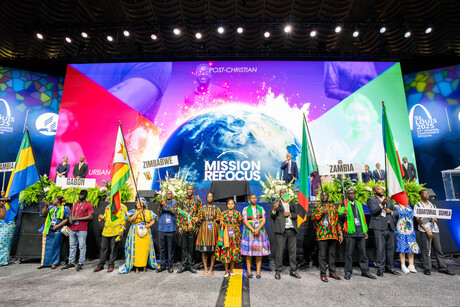Music: The War Department of the Church
An evangelical pastor once quipped, “If I were to change my theology, I’d lose 10 percent of my members. If I changed the music style in my church, I’d lose 50 percent.”
Why is this topic such a lightning rod for so many saints? Well if it’s any consolation, controversy over music isn’t a new phenomenon.
• In the early third-century Christian church, instrumental music was generally forbidden due to its association with immorality. The lyre was connected to prostitution.
• By the next century, Bishop Ambros of Milan replaced biblical poetry by introducing metrical hymns into the church. He was severely criticized because they were composed by “heretics.”
• By the seventh century, individuals began singing solos in the church. The response by some was, “I came to worship God not man.”
• 13th-century choirs graduated from single melody to four-part harmony, evoking a denunciation for bringing chaos into the church.
• In the 1500s, John Calvin hired two secular composers to put his theology to music. The Queen of England was so infuriated by these “vulgar tunes,” she referred to them as his “Geneva Jigs.”
• The 16th-century debate was over congregational singing of sacred songs. Some felt that to have mere lay people singing would profane the holiness of worship.
• When George Fredrick Handel wrote the Messiah in 1741, it was condemned as “vulgar theater” by religious leaders and criticized for its repetition of nearly 100 hallelujahs.
• The 17th century was a turning point for Christian music as many were outraged by the introduction of the new “tool of the Devil"—the organ.
• 18th-century song writer Isaac Watts is revered today for producing the first hymnal in the English language. He wrote such great classics as “O God Our Help in Ages Past” and “When I Survey the Wondrous Cross.” Yet in his day, one critic wrote of the hymnal, “There are several reasons for opposing it. One, it’s too new. Two, it’s often worldly, even blasphemous. The new Christian music is not as pleasant as the more established style [and] there are so many new songs, you can’t learn them all. This new music creates disturbances, making people act indecently and disorderly. [Besides] the previous generation got along without it.” Somehow that last statement has a somewhat familiar ring, doesn’t it?
• And then in the 20th century, when the potential of radio was discovered, ministers began religious programming with preaching and music. Many were criticized because the airwaves were considered the domain of Satan.
• And lest we laugh only at those before us and their “narrow” views of worship music, let me remind us of something that happened at the Oregon camp meeting last summer. Sabbath afternoon featured a concert by the original Wedgwood Trio, who played to a large, appreciative audience in the main tent. Some didn’t remember that when the trio first toured with H.M.S. Richards Jr. in 1967, they were forbidden to play in the main tent on the grounds. And Richards was severely criticized for bringing this radical, modern music to camp meeting.
So what do we do about this historic dilemma? We are thankful that musicians with various styles persisted in composing and performing. If not, we would not only be without some of the great hymns of the church, we would never have thrilled to the strains of the majestic Messiah.
Furthermore, we might never be blessed in worship by the sounds of a pipe organ or a guitar. And, oh yes, the witness of the Christian radio stations never would have aired.
So what is the answer? What can we learn from the past? Obviously, if there were a single solution, the controversy would have been resolved centuries ago. The fact that music has divided churches for a thousand years and is still splitting churches today should teach us something.
Next month we’ll look at some practical ways to make the worship music in your church not only pleasing to God but also bring harmony (in every sense of the word) to your congregation.








